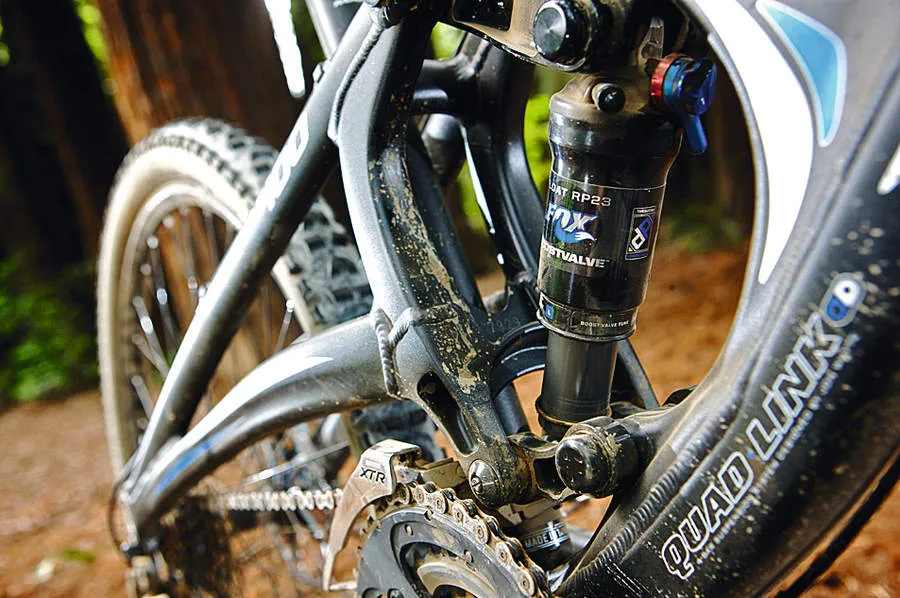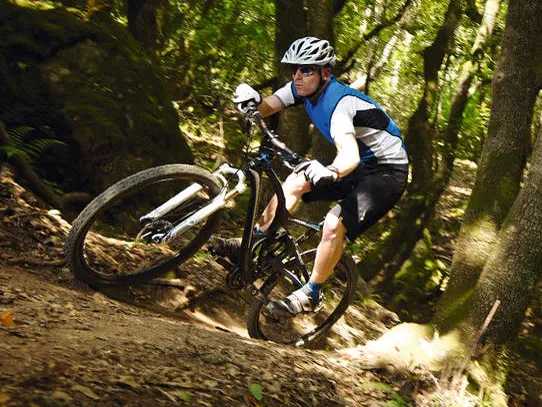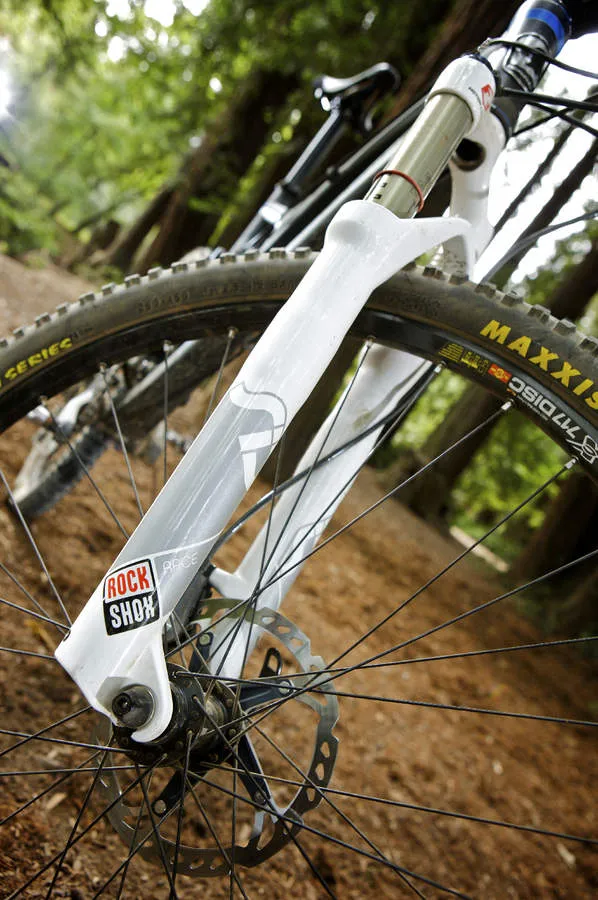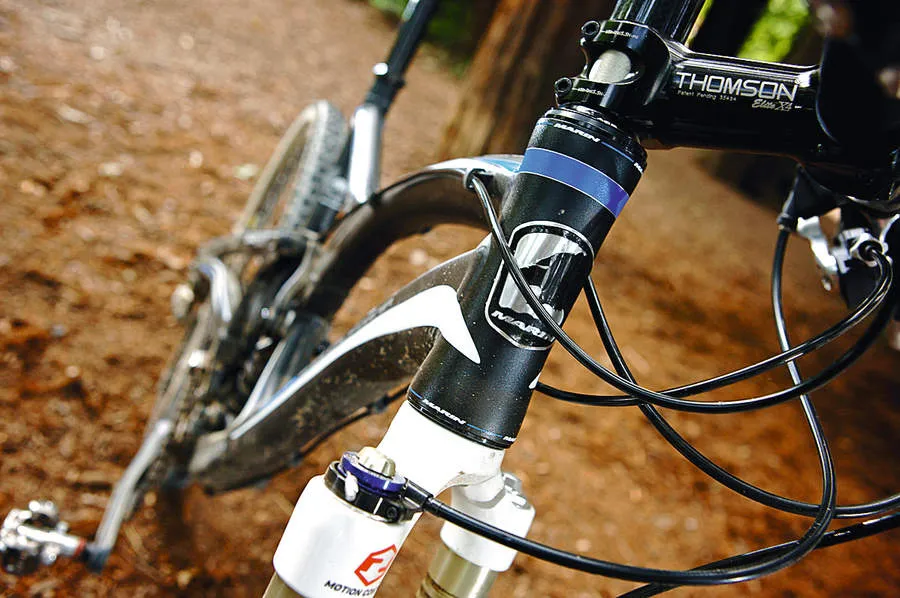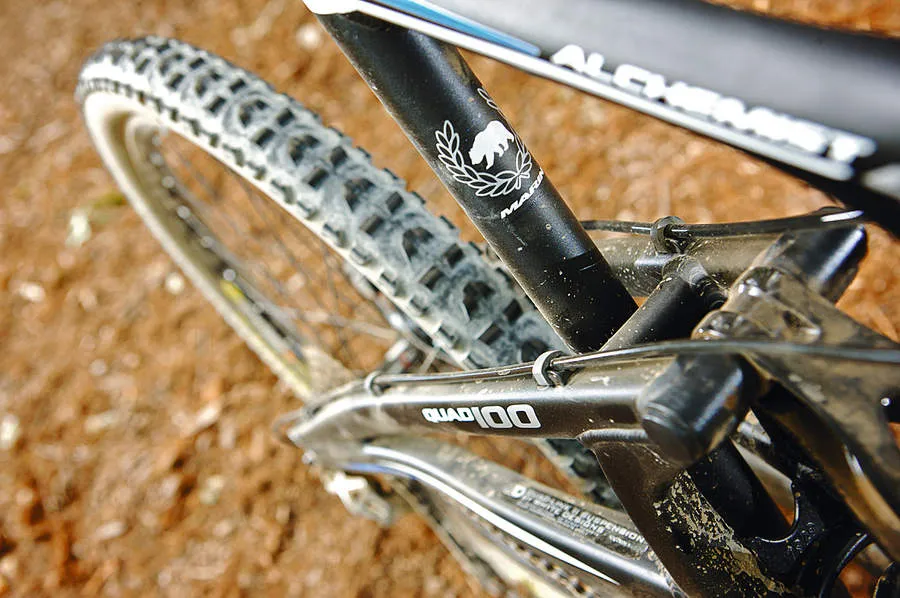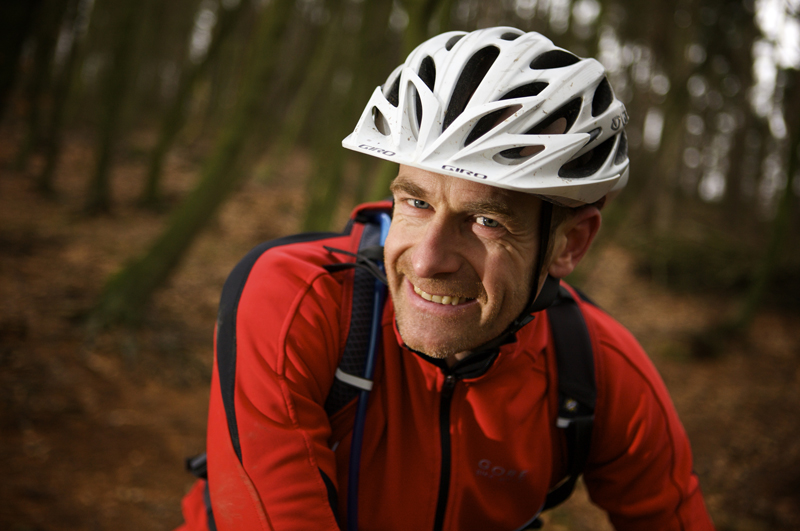Short travel (100mm) trail bikes are the hot category right now and Marin’s new Alchemist 4.9 is designed to put them in the thick of aggressive cross-country action. But turning base alloy into lightweight gold has proved much more difficult than Marin initially thought.
They have obviously worked really hard to reconfigure their suspension and geometry to deliver a bike that climbs well and handles very neutrally too. Add good tyre room, warrantied bearings and clean cable routing, and you’re looking at a short-travel trail bike with a solid three out of five score.
But don’t be fooled into thinking it’s a cutting-edge racer by the Easton SL bar and SID fork – it’s just too heavy to compete with its obvious cross-country/marathon adversaries and it’s costly, which drops our final score to an average 2.5.
Ride & handling: Obedient rather than distinctive, and heavy for its travel
The ride character of the Alchemist is appropriately rapid. New linkages and pivot positions for the Quad Link suspension mean a more linear shock leverage and noticeably less pedal feedback.
This is particularly noticeable when climbing, where the Alchemist rarely requires you to reach down and flick the ProPedal platform damping lever on the Fox shock, even when you’re grovelling in the granny ring, and there’s less sudden spit of traction on loose terrain than on previous Quad Link bikes too.
The long top tube gives plenty of breathing space when your lungs are at their limit and it definitely feels like a fast, racey bike. The suspension translates torque into traction well, and it climbs efficiently and enjoyably up smooth or sketchily steep slopes. Production bikes will get slightly lighter and distinctly faster rolling Maxxis Aspen tyres, which will perk things up.
The stiff frame means the Alchemist is definitely not as sketchy as some super-light carbon or whippy alloy rigs on the descents, and it holds lines precisely and accurately when you’re over the front and pushing hard. It’ll also take a decent beating in its stride if you do just lean back and let the Fox shock sort it out.
The combination of the dual air spring RockShox SID fork and the variable compression settings on the Fox RP23 shock gives plenty of feel-fettling options, from pert to plush.
Relatively conservative handling angles and a 25in bar translate to an obedient rather than distinctive ride though. It’s certainly not as fun to sling around the singletrack as similarly weighty short-travel trail bikes like the Orange ST4, and it’s not as leading edge as the Giant Anthem either.
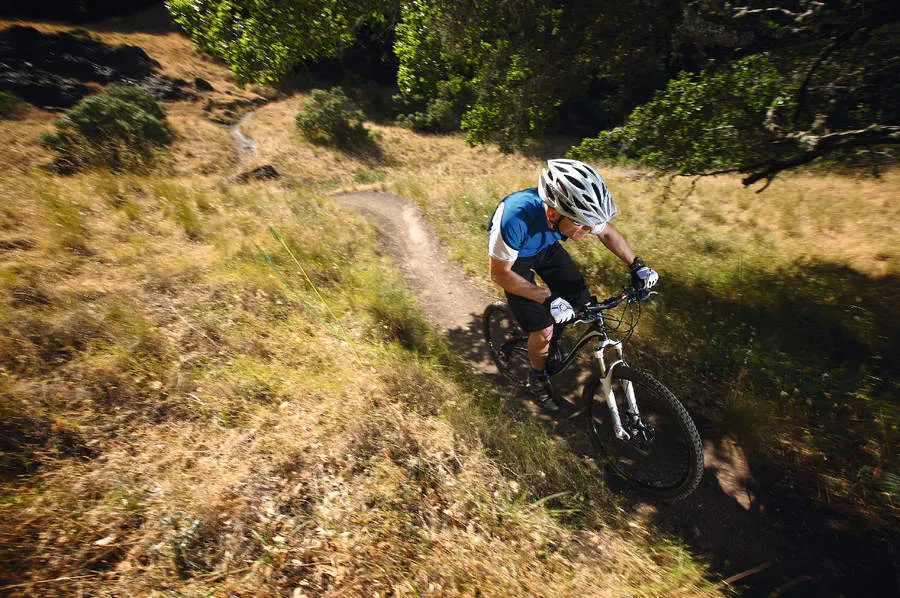
Frame: Strikingly unconventional; tough and trail-ready
The Alchemist is a completely new frame design from the ground up and the strikingly unconventional mainframe is a radical departure from the outline of previous bikes. Marin don’t hide the fact that getting the Alchemist through the latest CEN safety standards has been a long, drawn-out process since the initial conception in 2007.
There’s even more work hidden in the mainframe than its unconventional looks would suggest. Multiple curved and hydroformed tubes, and clamshell monocoque sections, conceal multiple tube wall thicknesses and butting profiles.
The down tube is ‘coined out’ with large drilled holes under the lower shock mount where you can’t see it. Different alloys have been deployed throughout too. Most of the tubing is 6066 aluminium, the seat tube is 6069, and 6061 alloy is used for the forged sections such as the knuckle shock mount section in the centre.
The resulting design may not be classic eye candy, but by repositioning the shock almost vertically Marin can use shorter, lighter rear stays when compared with the Mount Vision frames.
As the stays are splayed further apart they also give more triangulation across the rear triangle, which means impressive stiffness across the rear axle despite using narrower ‘Y’ linkages. The same modular dropouts as Marin's 120mm and 140mm bikes mean you can even upgrade to a Maxle Lite rear axle if you want.
The wider integrated head tube also increases stiffness and the low slung, multi-part frame offers plenty of standover in the centre if you stall on a steep climb. There’s a forward-facing seat slot, the complete outer cable routing is neatly stowed and there’s loads of tyre space. As usual, Marin will replace the suspension bearings for free if you wear them out.
The result is a frame that’s tough and trail ready. As Jason Faircloth from Marin says: “This is not a crazy light Formula One car for the dirt. If you crash it, it’ll scratch, not smash.” That’ll no doubt please aggressive riders, but at 3.09lb (1.40kg) the front end is actually heavier than the 120mm travel Mount Vision.
Although the lighter shock, linkages and shorter rear stays mean complete chassis mass is lighter than the 120’s, 6.74lb (3.05kg) is still overweight for a 100mm cross-country frame. To twist the knife, Marin’s 2010 120mm bikes will upgrade to Alchemist seat stays, reducing their weight by 200g – and come with better climbing manners too.
The Alchemist may well be CEN tough, cope with mud well and last for ages but it lacks the searing acceleration and euphoric endorphin rush of its obvious race competitors.
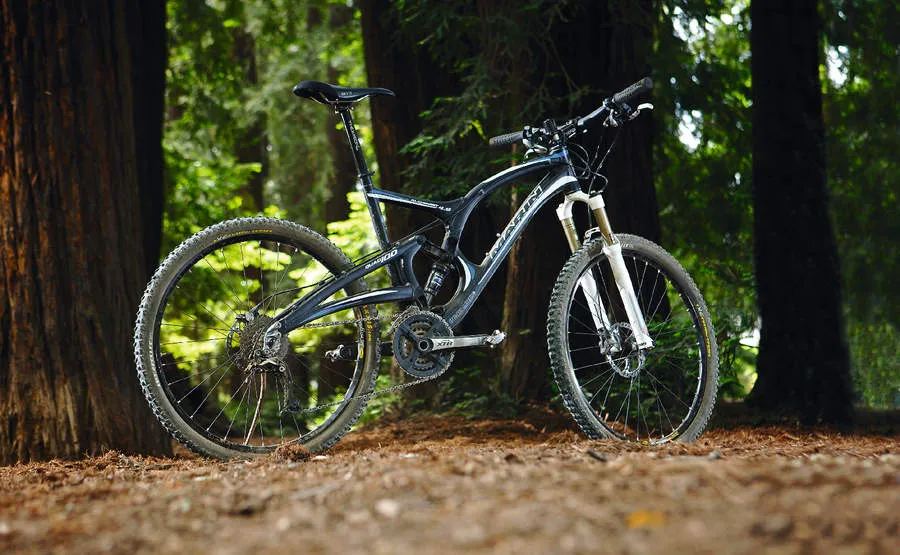
Equipment: Brakes lack power, but heavy frame means it may not be worth upgrading parts
If we have a niggle with the spec, it's the lack of confidence in the underpowered 160mm-rotor Shimano XTR brakes, which definitely affects descending pace. In reality this is small beer though and, even with a whole suite of XTR and pimp parts, there’s no escaping the major issue with the Alchemist: with a frame weight nearer that of a 6in bike, it’s simply too heavy for its category. As the weight is in the frame not the parts, there’s no prospect of upgrading it away either.
Tester says...
There's a lot we like about the Alchemist. The suspension pedals well and is more neutral under power or body shift than previous Marins. It handles with accurate poise and encourages you to get a hurry on.
With a weight penalty equivalent to a full water bottle over its obvious rivals, it's hard not to see the Alchemist as more base metal than gold medal material.
The designer says...
We spoke to Ian Alexander, Marin’s chief designer, about the long-awaited Alchemist...
Who is your target rider?
Riders who need a good all-round cross-country bike, or a short-travel trail bike. We rode lots of 100mm suspension bikes at the start of this project, and they were pretty much all sharp, race developed and not actually very good away from the race track. We found most 100mm suspension bikes don’t seem to work very well — they tend to require lockouts or low speed compression damping to get them to feel fast.
How long has the Alchemist project taken?
We started it in early 2007, with CAD simulation, a couple of prototypes and then the 3D CAD stage. Geometry has taken lots of riding to get right, as well as factory testing.
Why did you adopt such a radically new layout?
Mostly function; it usually comes down to function. Marin’s endurance riders were keen to see a bottle inside the main frame, and to keep a low standover. That meant pulling the shock back and making it more vertical. It’s rare to see an elevated chainstay bike with an upright shock but we always like to use a swinging arm design for the mud clearance.
How much weight did passing the CEN tests add?
Luckily CEN threw up only a few areas, but there’s no question that, post-CEN, all bikes will be carrying a little more weight in certain places than they did before introduction.
Do you feel that compromises the overall performance?
The CEN test is like any other test and assumes the heaviest of rider weights, but any slight weight increase due to CEN isn’t really a noticeable increase — so no, it’s not bad news performance-wise.
